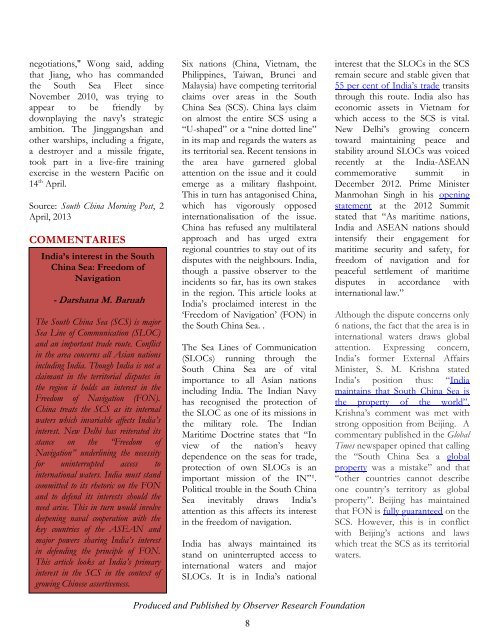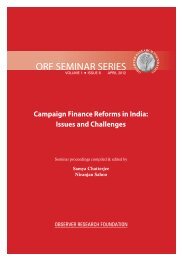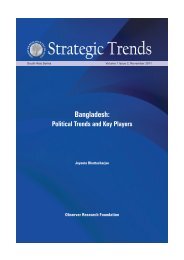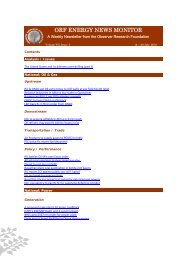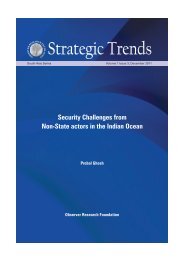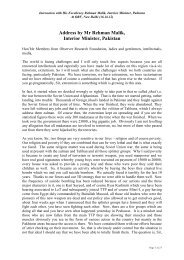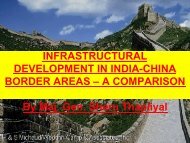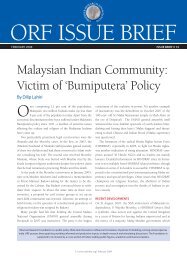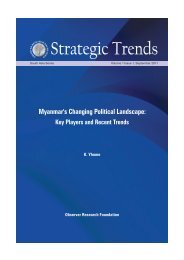Produced and Published by Observer Research Foundation 1 Vol. II ...
Produced and Published by Observer Research Foundation 1 Vol. II ...
Produced and Published by Observer Research Foundation 1 Vol. II ...
Create successful ePaper yourself
Turn your PDF publications into a flip-book with our unique Google optimized e-Paper software.
negotiations," Wong said, adding<br />
that Jiang, who has comm<strong>and</strong>ed<br />
the South Sea Fleet since<br />
November 2010, was trying to<br />
appear to be friendly <strong>by</strong><br />
downplaying the navy's strategic<br />
ambition. The Jinggangshan <strong>and</strong><br />
other warships, including a frigate,<br />
a destroyer <strong>and</strong> a missile frigate,<br />
took part in a live-fire training<br />
exercise in the western Pacific on<br />
14 th April.<br />
Source: South China Morning Post, 2<br />
April, 2013<br />
COMMENTARIES<br />
India’s interest in the South<br />
China Sea: Freedom of<br />
Navigation<br />
- Darshana M. Baruah<br />
The South China Sea (SCS) is major<br />
Sea Line of Communication (SLOC)<br />
<strong>and</strong> an important trade route. Conflict<br />
in the area concerns all Asian nations<br />
including India. Though India is not a<br />
claimant in the territorial disputes in<br />
the region it holds an interest in the<br />
Freedom of Navigation (FON).<br />
China treats the SCS as its internal<br />
waters which invariable affects India’s<br />
interest. New Delhi has reiterated its<br />
stance on the “Freedom of<br />
Navigation” underlining the necessity<br />
for uninterrupted access to<br />
international waters. India must st<strong>and</strong><br />
committed to its rhetoric on the FON<br />
<strong>and</strong> to defend its interests should the<br />
need arise. This in turn would involve<br />
deepening naval cooperation with the<br />
key countries of the ASEAN <strong>and</strong><br />
major powers sharing India’s interest<br />
in defending the principle of FON.<br />
This article looks at India’s primary<br />
interest in the SCS in the context of<br />
growing Chinese assertiveness.<br />
Six nations (China, Vietnam, the<br />
Philippines, Taiwan, Brunei <strong>and</strong><br />
Malaysia) have competing territorial<br />
claims over areas in the South<br />
China Sea (SCS ). China lays claim<br />
on almost the entire SCS using a<br />
“U-shaped” or a “nine dotted line”<br />
in its map <strong>and</strong> regards the waters as<br />
its territorial sea. Recent tensions in<br />
the area have garnered global<br />
attention on the issue <strong>and</strong> it could<br />
emerge as a military flashpoint.<br />
This in turn has antagonised China,<br />
which has vigorously opposed<br />
internationalisation of the issue.<br />
China has refused any multilateral<br />
approach <strong>and</strong> has urged extra<br />
regional countries to stay out of its<br />
disputes with the neighbours. India,<br />
though a passive observer to the<br />
incidents so far, has its own stakes<br />
in the region. This article looks at<br />
India’s proclaimed interest in the<br />
‘Freedom of Navigation’ (FON) in<br />
the South China Sea. .<br />
The Sea Lines of Communication<br />
(SLOCs) running through the<br />
South China Sea are of vital<br />
importance to all Asian nations<br />
including India. The Indian Navy<br />
has recognised the protection of<br />
the SLOC as one of its missions in<br />
the military role. The Indian<br />
Maritime Doctrine states that “In<br />
view of the nation’s heavy<br />
dependence on the seas for trade,<br />
protection of own SLOCs is an<br />
important mission of the IN”¹.<br />
Political trouble in the South China<br />
Sea inevitably draws India’s<br />
attention as this affects its interest<br />
in the freedom of navigation.<br />
India has always maintained its<br />
st<strong>and</strong> on uninterrupted access to<br />
international waters <strong>and</strong> major<br />
SLOCs. It is in India’s national<br />
interest that the SLOCs in the SCS<br />
remain secure <strong>and</strong> stable given that<br />
55 per cent of India’s trade transits<br />
through this route. India also has<br />
economic assets in Vietnam for<br />
which access to the SCS is vital.<br />
New Delhi’s growing concern<br />
toward maintaining peace <strong>and</strong><br />
stability around SLOCs was voiced<br />
recently at the India-ASEAN<br />
commemorative summit in<br />
December 2012. Prime Minister<br />
Manmohan Singh in his opening<br />
statement at the 2012 Summit<br />
stated that “As maritime nations,<br />
India <strong>and</strong> ASEAN nations should<br />
intensify their engagement for<br />
maritime security <strong>and</strong> safety, for<br />
freedom of navigation <strong>and</strong> for<br />
peaceful settlement of maritime<br />
disputes in accordance with<br />
international law.”<br />
Although the dispute concerns only<br />
6 nations, the fact that the area is in<br />
international waters draws global<br />
attention. Expressing concern,<br />
India’s former External Affairs<br />
Minister, S. M. Krishna stated<br />
India’s position thus: “India<br />
maintains that South China Sea is<br />
the property of the world”.<br />
Krishna’s comment was met with<br />
strong opposition from Beijing. A<br />
commentary published in the Global<br />
Times newspaper opined that calling<br />
the “South China Sea a global<br />
property was a mistake” <strong>and</strong> that<br />
“other countries cannot describe<br />
one country’s territory as global<br />
property”. Beijing has maintained<br />
that FON is fully guaranteed on the<br />
SCS. However, this is in conflict<br />
with Beijing’s actions <strong>and</strong> laws<br />
which treat the SCS as its territorial<br />
waters.<br />
<strong>Produced</strong> <strong>and</strong> <strong>Published</strong> <strong>by</strong> <strong>Observer</strong> <strong>Research</strong> <strong>Foundation</strong><br />
8


